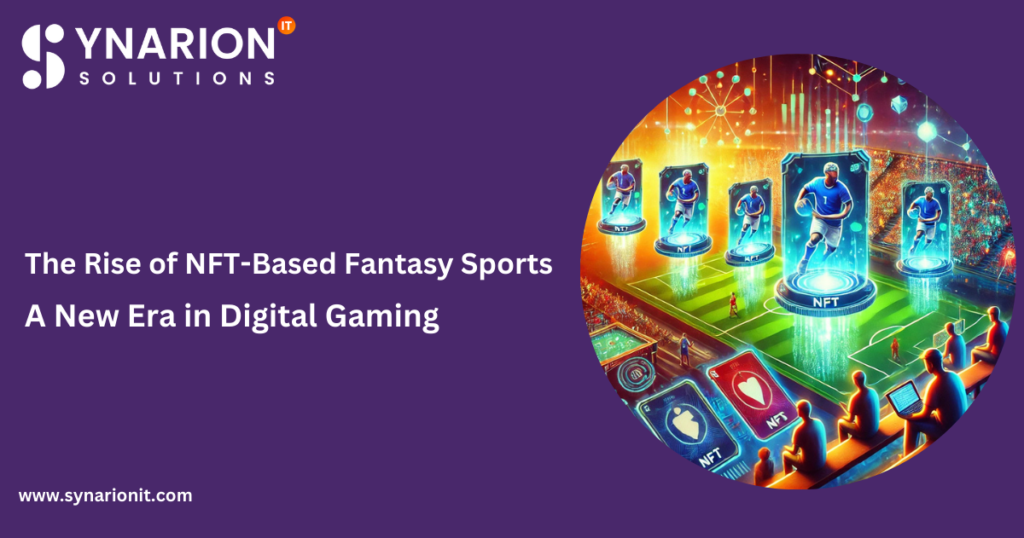Fantasy sports have transformed the way fans engage with their favorite games, offering a unique blend of strategy, competition, and real-world sports knowledge. With the rise of blockchain technology, NFT-based fantasy sports have introduced a new dimension to digital gaming, bringing enhanced ownership, rarity, and monetization opportunities. A leading fantasy sports app development company plays a crucial role in shaping this new trend by integrating blockchain technology into fantasy sports platforms.
In this blog, we will explore how NFT-based fantasy sports are revolutionizing digital gaming and the role of fantasy sports app development in this transformation.
What Are NFT-Based Fantasy Sports?
NFT-based fantasy sports integrate non-fungible tokens (NFTs) with traditional fantasy sports platforms, allowing users to own unique digital assets such as player cards, jerseys, or collectibles. These assets can be traded, sold, or used within fantasy leagues, giving users true ownership and value beyond standard gameplay.
Unlike conventional fantasy sports, where users create teams based on real-life players’ performances, NFT-based fantasy sports introduce a decentralized, blockchain-powered ecosystem where player assets hold long-term value and rarity.
Key Features of NFT-Based Fantasy Sports
1. Ownership & Rarity
NFTs allow users to own unique digital assets, such as limited-edition player cards or custom avatars. Unlike traditional fantasy sports platforms, where assets have no real ownership, NFT-based platforms ensure players can buy, sell, or trade their in-game items securely.
2. Play-to-Earn (P2E) Model
Users can earn rewards through gameplay, including cryptocurrency payouts, rare NFTs, and other digital prizes. This introduces an additional incentive for players beyond entertainment, making fantasy sports a potential source of income.
3. Blockchain Transparency & Security
With blockchain integration, all transactions are secure, transparent, and tamper-proof. This eliminates concerns related to fraud, unfair game mechanics, or unauthorized changes to player rankings and stats.
4. Interoperability
NFT-based fantasy sports assets can often be used across multiple platforms or games, enhancing their value and utility. For instance, a player card purchased in one fantasy sports platform could be integrated into other gaming ecosystems.
5. Smart Contracts for Fair Play
Smart contracts automate transactions and ensure fairness in the game. For example, prize distributions, player trades, and tournament results are all managed by blockchain-based contracts, reducing the need for manual intervention.
How NFT-Based Fantasy Sports Are Changing Digital Gaming
1. Redefining Player Engagement
NFT-based fantasy sports make engagement more immersive by allowing users to invest in digital assets with real-world value. Users are not just playing; they are building portfolios of valuable digital sports collectibles.
2. New Revenue Opportunities for Players & Developers
Players can monetize their gaming skills by trading NFTs or participating in tournaments with cryptocurrency rewards. For developers, an effective fantasy sports app development strategy includes integrating NFT marketplaces, allowing in-game purchases, and enabling peer-to-peer trading.
3. A Decentralized Gaming Ecosystem
Traditional fantasy sports platforms rely on centralized systems controlled by a single authority. Blockchain-based platforms provide a decentralized environment where users have greater control over their assets and gameplay experience.
4. Building Communities Through DAOs
NFT-based fantasy sports platforms often incorporate Decentralized Autonomous Organizations (DAOs), where players have voting rights on game updates, reward structures, and governance decisions, creating a truly player-driven experience.
5. Bridging the Gap Between Fantasy Sports & Esports
The combination of fantasy sports and NFTs brings elements of esports into the mix, creating hybrid gaming experiences that attract a broader audience.
Role of Fantasy Sports App Development Companies in the NFT Revolution
A fantasy sports app development company plays a crucial role in bringing NFT-based fantasy sports to life. Here’s how they contribute to the success of these platforms:
1. Developing Blockchain-Integrated Fantasy Sports Apps
Fantasy sports app developers build platforms that leverage blockchain technology to enable NFT ownership, smart contract automation, and secure transactions.
2. Creating Custom NFT Marketplaces
Developers integrate NFT marketplaces within fantasy sports apps, allowing users to buy, sell, and trade digital assets easily.
3. Enhancing User Experience with AR/VR Features
Augmented reality (AR) and virtual reality (VR) elements make NFT-based fantasy sports even more engaging. For example, users can interact with their digital assets in a virtual stadium setting.
4. Ensuring Scalability & Performance
With a growing number of users, scalability is crucial. A fantasy sports app development company ensures that the platform can handle large volumes of transactions and user interactions without lag.
5. Implementing Secure Payment & Crypto Wallet Integrations
To support cryptocurrency transactions, developers integrate secure wallets that allow users to store and trade NFTs safely.
The Future of NFT-Based Fantasy Sports
The future of NFT-based fantasy sports looks promising, with continued advancements in blockchain technology, AI-driven analytics, and immersive gaming experiences. Here are some trends to watch:
- AI-Powered Fantasy Sports Predictions: AI and machine learning will enhance player selection strategies by providing real-time insights and predictive analytics.
- Cross-Platform NFT Integration: More games and platforms will support interoperability, allowing NFT assets to be used across different digital ecosystems.
- Mainstream Adoption & Partnerships: Major sports leagues and franchises are likely to partner with fantasy sports platforms to launch official NFT collections.
- Integration with the Metaverse: Fantasy sports games will become part of larger metaverse ecosystems, offering a more immersive and interactive gaming experience.
Conclusion
NFT-based fantasy sports are revolutionizing the way users engage with digital gaming by offering true ownership, decentralized gameplay, and lucrative earning opportunities. As this industry continues to grow, partnering with a fantasy sports app development company is essential for businesses looking to capitalize on this trend.
If you are looking to build an innovative NFT-based fantasy sports platform, investing in fantasy sports app development is the key to staying ahead in this digital gaming revolution. The future of fantasy sports is here—powered by blockchain, driven by NFTs, and shaped by cutting-edge technology.



